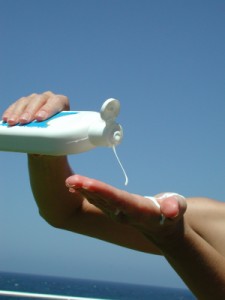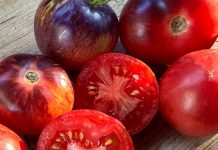Its big bright yellow/orange globe lights up the world in a life giving force. Though many view the sun as an evil to be avoided because of its detrimental effects on the body, I see the sun comforting us with the ability to live.
And what would the beaches and pools and summer fun be without the sun? A sad and cloudy day. Sun truly is a good thing.
First of all, the sun provides us with a precursor to vitamin D, it’s UVB rays converting a chemical in our skin into D3 which is then carried to the liver then the kidneys to transform it to an active form of vitamin D. It’s important to have D for bone, prostate, and colon health.
So this summer, go on out and enjoy the sun, but take along these words of wisdom. There is new research that suggests some foods have the power to protect the skin from damage caused by he sun’s UV radiation. Go ahead and add some inner protection against sunburn and wrinkles at the cellular level.
My top most favorite on the list is cocoa. That’s right, dark chocolate, preferably raw. Cocoa contains four times more phenols and catechins as tea, antioxidants that protect our skin. True, dark raw chocolate, sans the milk, is best so the body absorbs the greatest amount of the antioxidants.
For another wonderful inner protection, make yourself a wonderful cold pitcher of green or black tea which is rich in polyphenols. Drinking two or more cups of the tea provides unrivalled action against free radical exposure which is responsible for most of the skin’s aging.
Carotenoids are antioxidants that battle the negative effects of UVB rays. Green leafy vegetables are one of the ways to add this hero. But include apricots, papaya, mango, carrots, sweet potatoes and beets to your salad to get the added benefits of carotenes, which is actually a pigment used by plants as a sunscreen and can add active melanin, the dark pigment the skin generates after being exposed to the sun’s UV rays.
carrots, sweet potatoes and beets to your salad to get the added benefits of carotenes, which is actually a pigment used by plants as a sunscreen and can add active melanin, the dark pigment the skin generates after being exposed to the sun’s UV rays.
A very important carotenoid, lycopene, found in tomatoes, watermelon (has 40% more than tomatoes), papaya, red peppers and pink grapefruit, has a SPF value of about 3. Not bad. Throw some pomegranate seeds onto that salad and boost the greens with anthocyanins, which strengthen the skin’s upper layers from UVs.
Tocotrienols, part of the vitamin E family, is found in oils and fats such as wheat bran, grapeseed, palm and coconut oil. They are also found in carrots, apricots, blueberries, black currants, grapes and olives. They neutralize free radical activity at a much faster rate than their tocopherol cousins.
Eat your citrus! Citrus contains a wonderful source of vitamin C, and prevents premature aging and skin cancer by tackling free radicals.
And what do all moms say to their kids? “Eat your broccoli!” Listen to mom and eat those “little trees” and protect the inner sanction of your body with anti-cancerous effects by protecting against UV radiation.
Keep up your Omega 3s to reduce inflammation from sunburn and protect against melanoma. Algae/seaweed, flax, hemp and chia seeds all contain these great fatty acids.
But best of all, hydrate your body with water after sun exposure to prevent dehydration. Keeping your skin hydrated encourages a healthy natural moisture factor that protects your skin from environmental factors.
As for topical protection, the debate continues on sunscreen. (Check out what is in your sunscreen at ewg.org/2013sunscreen.) I truly believe we need the benefits of the sun, especially the D factor, and the overuse of sunscreen deprives us of that hormone in our body.
Getting an adequate daily exposure is essential to health, but when getting close to the point of burning, be sure to cover-up with a hat and long sleeves. For those occasions of long sun exposure at the beach or swimming, use a natural sunscreen with simple ingredients you can pronounce. Or better yet, make your own. Lots of recipes can be found on the internet.
So with summer just beckoning us into the lovely fun of being in the sun, treat yourself to those life giving foods that benefit the skin.
Gina Dostler can be reached at Ima_gina_tion@yahoo.com.





